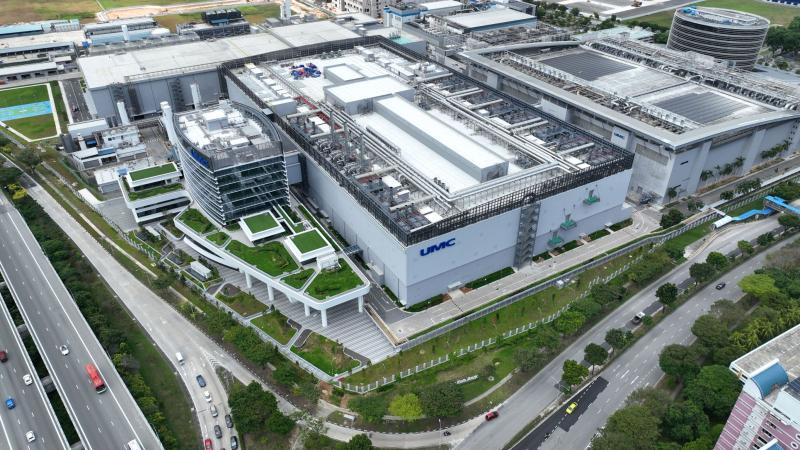United Microelectronics Corp (UMC, 聯電), the world’s No. 4 contract chipmaker, yesterday launched a new US$5 billion 12-inch chip factory in Singapore as part of its latest effort to diversify its manufacturing footprint amid growing geopolitical risks.
The new factory, adjacent to UMC’s existing Singapore fab in the Pasir Res Wafer Fab Park, is scheduled to enter volume production next year, utilizing mature 22-nanometer and 28-nanometer process technologies, UMC said in a statement.
The company plans to invest US$5 billion during the first phase of the new fab, which would have an installed capacity of 30,000 12-inch wafers per month, it said.

Photo courtesy of United Microelectronics Corp
The new fab is to produce chips used in premium smartphone displays, power-efficient memory chips for Internet of Things devices and next-generation connectivity chips, it said.
Together with the existing 12-inch factory, UMC would have a combined capacity of 1 million wafers in Singapore after the new fab becomes operational next year, the chipmaker said.
UMC copresident S.C. Chien (簡山傑) said in the statement that the new fab enhances the chipmaker’s ability to meet demand and enhance its supply chain resilience.

Photo courtesy of United Microelectronics Corp
The capacity expansion plan is expected to create approximately 700 jobs over the next few years, including engineers for process and equipment, as well as research and development.
Separately, UMC said it has no merger-and-acquisition deals on the table at the moment, dismissing a report from online news site Nikkei Asia that the company is restarting a merger assessment with US contract chipmaker GlobalFoundries Inc.
More than 10 years ago, the contract chipmakers considered a merger and consolidation, but the idea was abandoned. UMC and GlobalFoundries both specialize in mature chip production.
In reporting that the two chipmakers were exploring a merger, Nikkei Asia said they were likely to create a bigger US-based company that would have broad production footprints across Asia, the US and Europe.
The report said the merger is expected to help the US gain access to mature chips amid escalating tensions across the Taiwan Strait.
The combination of the two companies would create an entity with a larger market share of 9.3 percent, surpassing Samsung Electronics Inc’s 9.1 percent, if they went ahead with the deal, Taipei-based researcher TrendForce Corp’s (集邦科技) data showed.
GlobalFoundries ranked as the world’s No.5 contract chipmaker after UMC. The San Jose, California-based chipmaker posted a loss of US$26 million last year, while UMC reported a net profit of NT$47.21 billion (US$1.42 billion).

South Korea’s equity benchmark yesterday crossed a new milestone just a month after surpassing the once-unthinkable 5,000 mark as surging global memory demand powers the country’s biggest chipmakers. The KOSPI advanced as much as 2.6 percent to a record 6,123, with Samsung Electronics Co and SK Hynix Inc each gaining more than 2 percent. With the benchmark now up 45 percent this year, South Korea’s stock market capitalization has also moved past France’s, following last month’s overtaking of Germany’s. Long overlooked by foreign funds, despite being undervalued, South Korean stocks have now emerged as clear winners in the global market. The so-called “artificial intelligence

NEW IDENTITY: Known for its software, India has expanded into hardware, with its semiconductor industry growing from US$38bn in 2023 to US$45bn to US$50bn India on Saturday inaugurated its first semiconductor assembly and test facility, a milestone in the government’s push to reduce dependence on foreign chipmakers and stake a claim in a sector dominated by China. Indian Prime Minister Narendra Modi opened US firm Micron Technology Inc’s semiconductor assembly, test and packaging unit in his home state of Gujarat, hailing the “dawn of a new era” for India’s technology ambitions. “When young Indians look back in the future, they will see this decade as the turning point in our tech future,” Modi told the event, which was broadcast on his YouTube channel. The plant would convert

‘SEISMIC SHIFT’: The researcher forecast there would be about 1.1 billion mobile shipments this year, down from 1.26 billion the prior year and erasing years of gains The global smartphone market is expected to contract 12.9 percent this year due to the unprecedented memorychip shortage, marking “a crisis like no other,” researcher International Data Corp (IDC) said. The new forecast, a dramatic revision down from earlier estimates, gives the latest accounting of the ongoing memory crunch that is affecting every corner of the electronics industry. The demand for advanced memory to power artificial intelligence (AI) tasks has drained global supply until well into next year and jeopardizes the business model of many smartphone makers. IDC forecast about 1.1 billion mobile shipments this year, down from 1.26 billion the prior

People stand in a Pokemon store in Tokyo on Thursday. One of the world highest-grossing franchises is celebrated its 30th anniversary yesterday.